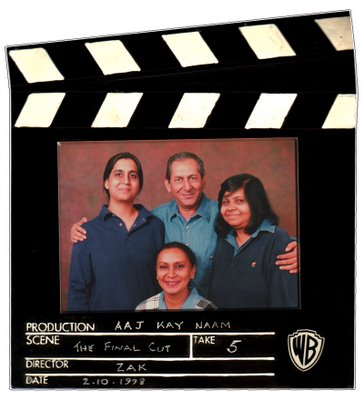Wednesday, October 29, 2008
Sunday, October 26, 2008
India 4: An uncanny tale ... (Part 2 — The Conclusion)
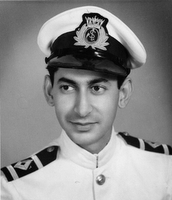 When you have had the benefit of a 25-year stint at sea (1959-1984), there is bound to be much that is narratable and shareable, with some of it even of interest to a few people outside your immediate family. But this post is, primarily, about Gupta Cha (and his family) - so I shall make only brief references to the other parts which will be covered in greater detail in "Ships and Shoes and Sealing Wax" (if that "book+" ever gets completed).
When you have had the benefit of a 25-year stint at sea (1959-1984), there is bound to be much that is narratable and shareable, with some of it even of interest to a few people outside your immediate family. But this post is, primarily, about Gupta Cha (and his family) - so I shall make only brief references to the other parts which will be covered in greater detail in "Ships and Shoes and Sealing Wax" (if that "book+" ever gets completed).However, as indicated at the end of my previous post, the real conclusion to the tale - which took place last year - will make up the second half of this post. The first will be spent breezing through the intervening years.
Ok, so it's 1947, the last day of September. Abi has finally received permission to extend his leave and proceed with the family to Karachi. We are to set sail on the S.S. DUMRA (of the British India Steam Navigation Co.) and are standing on a pier.
 There's a mad rush wherever one casts an eye. If I had known of the concept then, I would probably have thought of Maedaané Hashr. The sounds of bawling from families being separated can be heard mingling with the shrill laughter of children running everywhere, excited by the journey.
There's a mad rush wherever one casts an eye. If I had known of the concept then, I would probably have thought of Maedaané Hashr. The sounds of bawling from families being separated can be heard mingling with the shrill laughter of children running everywhere, excited by the journey.The 5 of us soon board the ship, bidding goodbye to Gupta Cha and to Badshah Chacha, who has travelled from South India to see us off. Standing with them is a close friend of my father, the amazing Dr. Baliga (one of my 'ideals' when I was a teenager), who was once invited to Pakistan to treat our Governor General, Ghulam Mohammad.
A couple of Sikh hockey players from the Bombay Sea Customs, 'fans' of Abbu Jan, have arrived to say goodbye to their Hockey Hero,
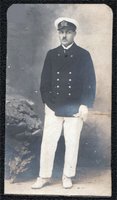
but now seem more interested in Chacha Jania (Talat Mahmood) whom they have cornered. As usual, he is too shy and polite to get away from them, though he wants to join us for parting hugs. The very moment that we start up the gangway, he runs towards us and the Sikhs shout out to all, "Yeh Talat Mahmood bhaaga jaa rahaa hae Pakistan. Roko. Roko." The laughs lighten the sad moment.
We are shown to a cabin which, though meant for 2+1, is spacious enough and the bistarband comes in handy. Soon, the ship's ropes are cast off and we move gently away from the pier. The air is suddenly filled with wave after wave of loud roars of Pakistan Zindabad and Quaid-e-Azam Zindabad. One can feel not just the passion but the freedom in those naaraas, suppressed at the pier where everyone realized that such slogans could incite riots.
Once Bombay harbour begins to fade out of sight, Abi contacts the officer who is doing the rounds to inform him that he is a doctor and available for any emergency help that the ship's team might need. An hour or so later, he is called up by the captain and, with two other doctors and a couple of nurses also travelling as passengers. They are introduced to the Ship's Medical Officer and agree to do frequent rounds and assist with any passengers needing help.
At some late hour we are woken up by Abi to meet - and accommodate, if possible - a couple trying to find a comfortable place to rest. He has found them on his very first round. The bearded husband is none other than poet Bahzaad Lakhnavi. Some of you may be familiar with Begum Akhtar's rendition of his "Deevaana Banaana Hae To ..."
Once a rangeen shaaer, Bahzaad Chacha later turned into a very prolific naat go, and now lies buried in Karachi with signs on the graveyard proclaiming his ishqé rasool. His unique tarannum was extremely popular with müshaerah audiences. The next 3 days of the journey are spent with him and Abi reciting ghazals to each other with a slowly increasing 'fan club' blocking the passageways.
The day before arrival in Karachi is my 7th birthday. Bahzaad Chacha gives me a shayr as gift. The original, in his hand, has long been lost ... but I still remember the words:
Abbu Jan gets a small temporary house somewhere near Jackson Bazaar in Keamari and, later, moves into the large Customs Flats nearby. We live with them for a few weeks while Abi - almost penniless - does the rounds in Karachi in the hope of finding a suitable job in some hospital. He does not wish to re-join the Army and has applied for release.Tüm ko tohfay mayñ aur kyaa dayñ ham?Lo nayaa mülk ... Iss mayñ phoolo phalo!
One day, quite by chance, Abi bumps into Swami Ji (as we always addressed him). He recognizes Abi as one of his fellow students at medical college. Abi learns that Swami Ji and two other colleagues run a charitable hospital - with free treatment for Hindus - under the Ramakrishna Mission.
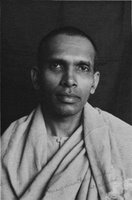
They are on the verge of leaving for India, after handing over the place to GoP (as evacuee property, I guess). The stock of medicines, good for about a year, is to be thrown out since transferring them to other hospitals is considered a major task of logistics and accounting.
Abi is apalled. He says he would like to continue running the hospital, without charging the Mission, until all the medicines run out. He promises to keep it free for Hindus if the Mission agrees that the free treatment could also be extended to Muslim refugees who cannot afford to pay. They agree, but there is the Government to convince. Abi's old Aligarian friend, Mr A. T. Naqvi, now the Commissioner of Karachi, arranges for this to be formalized and, suddenly, Abi has a job which, though it carries no salary, comes - to our delightful surprise - with a small 2 room apartment on Nazareth Road (half-way between Guru Mandir and Soldier's Bazaar). We live next to the larger apartment occupied by Swami Ji and his colleagues. I am in and out of their house all day, devouring all the Idlees and Dossas and Rasm they can feed me - which explains my desire to dart off to the South Indian Sagar restaurant the moment I get to Dilli. (If you ever go there, be sure to try their almost-3-foot-long Paper Dossa.)
Diversion The Nazareth Road house is purchased the following year by a Nawab Hasan Yar Jang (nephew of the colourful Nizam of Hyderabad) and Swami Ji manages to have it written into the agreement that as long as Abi is alive he can continue to stay in that apartment, paying rent - of course. The Swamis leave in a few months. Nawab Sahab - always very civil when we encounter him in the building - shifts in with his 'lingerers on'. He gives me my favourite mithai - genuine Baadaam Ki Lauz - whenever he receives a package of it from Hyderabad. I even get to go with him and (What a treat!) sit in the Royal Stall to attend the Platinum Jubilee of Aga Khan III (grandfather of the present one), a ceremony Nawab Sahab is attending on behalf of the Nizam.
But Nawab Sahab is a stickler for words. The contract says that my father can occupy the house as long as he lives. On 18th September 1963 my ship happens to arrive in Karachi.On the 19th my father dies. (Abbu Jan and Ammi Jan are getting a house built in Iqbal Town and are temporarily staying with us, which offers Ummi and me a bit of solace, since we have all been very close, always.) The Nawab attends the funeral, comes into the house to condole with my mother, and informs me on his way out that we have to vacate the house in 48 hours! Which is what I try to do, but it takes a bit longer and needs the good offices of neighbour, ex-Mayor Khan Bahadur Gabol Sahab, to convince the Nawab. I sail away two days after our hurried shifting. This trip to Karachi has been a life-changing experience for someone only 23 years old. But let me get back on track.
Gupta Cha is in touch by mail and we receive a picture of him and Chachi soon after their wedding in 1949 or 1950.
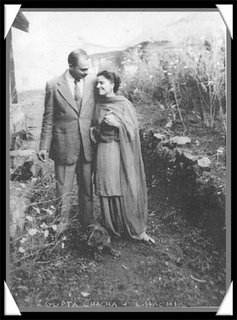 This exchange continues, off and on. When Abi dies, Ummi receives a very warm letter from them, asking "Bhabiji" to stay with them in Dilli for a while. But the trip never materializes. We couldn't afford it. Then, for some reason - possibly mail going astray after the 1965 war - we all lose touch.
This exchange continues, off and on. When Abi dies, Ummi receives a very warm letter from them, asking "Bhabiji" to stay with them in Dilli for a while. But the trip never materializes. We couldn't afford it. Then, for some reason - possibly mail going astray after the 1965 war - we all lose touch.For years I search for him ... but can recall neither his rank nor anything else. Whenever my ship is at an Indian port, I try to think up ways to find Gupta Cha. Trying to find a 'Gupta' in the Indian army, I am told, is just short of tracing the right 'Khan' in Afghanistan.
Zoom ahead to 1983: I am in command of a ship operated by the Gokals out of Hong Kong. The officers and crew of these ships are multinational and on my ship the Chief Engineer, Vipin Kaura, is from India. Vipin's father - a retired Army officer - comes from Dilli to visit our ship and stays there for a few days.
Soon after 'Uncle Kaura' arrives, I decide to go wish him. I plan to remember to say Aadaab in the old tradition but my Pakistani Radio Officer - a Lahori - tells me that that was not as common a greeting in Punjab as in Delhi and the U.P., so maybe I should say Namsté to be polite. I walk in and say that, a bit awkwardly, failing badly at the hand coordination for the accompanying gesture. Uncle Kaura - originally from Rawalpindi - says. "Aray ... hum to soach rahay thay keh bohat din baad Salaam Alaeküm sünnay ko milay ga ..." and soon the talk turns to his homesickness and losing touch with old friends. He regrets forgetting to write Urdu well.During the stay I recount 'our' partition story and he asks me if there is anything I can recall about Gupta Cha that could help trace him. Apart from his first name, Birjesh, I usually can't recall anything. But from some hidden corner of my mind, that day, I bring forth two facts that I'd never consciously recalled earlier. Someone in Gupta Cha's family - possibly his father? - was a Judge. And they lived in a house called Bürj Mahal in Meerut. Before he leaves the ship and heads home, Uncle Kaura says he will ask some old colleagues about Gupta Cha but doubts if anything will come of it.
Five days later, I am standing at the Shipping Agency office when I am handed an envelope posted from Delhi, addressed to me. I open it and discover a letter in Urdu in a shaky hand. It starts "Pyaaray Baytay ...". "How sweet of Uncle Kaura," I think to myself, "to try and write in Urdu after all these years." But the next para that I read (writing this I am still feeling the same sensation as I did then) is something I cannot believe. I jump ahead and look at the bottom of the next page. YESSSSS! It says "Tümhaara Gupta Cha". It takes me an interminable amount of time to absorb this. A clerk comes up and asks if I am OK. I have tears streaming down my cheeks and can barely speak as I read about Gupta Cha thinking each year of me on my birthday, admittedly not difficult to remember in India (It's Gandhi Ji's, too!). I read and re-read the letter. He wants me to fly out to Delhi. Of course I cannot (not just because of the visa but because we sail out in 2 days).
It turns out that Uncle Kaura, immediately on his return to Delhi, took a bus to Meerut and spent the day searching for Bürj Mahal. Unsuccesful at his attempt, he stopped at a shop in a multistory building to have a cold drink before taking the bus back. The shopkeeper and he got into a conversation and he mentioned his search for Bürj Mahal. "This very building is where it used to be," said the shopkeeper, "and the old owners live right on top, I think." So up climbed Uncle Kaura and met Gupta Cha's sister-in-law and told her the tale. She recalled our family and informed Uncle Kaura that Gupta Cha lived in Delhi! Defence Colony!! One lane behind Uncle Kaura's house!!! (Yes, Woody Allen. Life does imitate bad television!). So it is to Uncle Kaura that I owe more than I had realized.After I regain control of my senses (and I am not dramatizing this ... it did take a while, as 36 years and all that's happened in that period ran through my mind) I immediately decide to phone him. And Ummi. Getting connected to Karachi, oddly, happens very quickly but I just manage to tell her that I've found Gupta Cha when, even more quickly, the line drops and we cannot get through again. Getting through to Delhi is a 'trunk call' - as calls between cities were then known - and requires a 'booking'. "It's about a 3-4 hour wait," says the operator. The manager of the agency, who, like everyone else in that room, has heard bits of my story by then, takes the phone from me and says something in Marathi, and then translates it for me. "Maeñ saalay ko bola 'Yeh jaldi type ka call hae! Death and Illness Emergency'. Abhee das minat mayñ mil jaae ga."
Of course I can't recall the conversation with Gupta Cha. Too full of both of us trying to fill the other in about everyone and everything. Sobs. Laughter. He tells me he has two children. The son, nicknamed 'T2' is in the army. His daughter, Nanu, is married to Sunil who is in the Navy and is posted in Bombay. I am excited. "Can I see her?" Gupta Cha gives me the address of her house in the Naval Colony and, still reeling from all this, I am put on a rickshaw by the friendly clerk who first tells the driver my story and then instructs him to wait wherever I am going and bring me back later and collect the money from the office as part of the celebrations for my joy. Awwwww.
So off I go. Kinda stupidly quick response, if I'd just thought a bit. I can't even get into the Naval Colony in my own city without some identity papers. And, as a Ship Captain from Pakistan, I should not even be near an Indian Navy area. But who was thinking? In retrospect, I often shudder. Had I been arrested and charged with a Pak spy masquerading as an Indian, I'd still be in jail there, if alive. But I was not pretending about anything. I was excited and that's all that must have shown on my face. No nervousness at all. Just a stupid pasted smile of the kind that airline staff bear. The clothes, too, helped. I was in a white khaddar kurta pyjama - my usual dress code for the evenings - a common sight in Bombay, anyway. The chatty rickshaw vaala, who informed me that he was a Muslim and had relatives in Karachi, spoke to the guard when he asked where we were headed. "Aray chho∂o yaar ... 30 saal baad behen say milnay jaa rahaa hae sahab!" And we were in.
The meeting with Sunil and Nanu was great. It was like being at home with people I'd always known. No takallüf. They already knew of me. Their elder daughter, Ayeshah, (named by Gupta Cha) fell asleep soon but I did get to carry around the new addition, 4-month old Amrita, after eating a lovely home-cooked meal, so that Nanu could eat in peace. I wish the ship would have stayed longer so I'd have got to spend more time with them.Later, I have laughed often at the thought that the Indian Naval Security services are at the same level as ours - recalling that in the 60s, when we docked in Karachi with ammunition that our ship had brought in from Iran, the whole port area was under security and passes were required to board the craft. Not even our own officers could step onto the quay and board the ship again without passes. Sitting in my room, I nearly leapt out of my chair as I saw an old friend from India walk in. "How the eff did you get on board? It's bloody tight security!" ... Bhagwan Das winked and said, "Full Paanch rupyah diya gate vaalay ko, yaar!"
For a year or so Nanu and I managed to stay in occasional contact, but Sunil was then posted to Vishikhapatnam, I think, and none my letters ever reached them, so we lost touch. Gupta Cha and I wrote to each other often and I phoned him from several ports - Hong Kong, Singapore, from wherever I could dial direct. He and Ummi, too, exchanged a few letters (in Urdu!). He was insistent that I hop across the border and stay with him for a few days. "I have a room reserved for you", he'd always tell me. But visas were an impossibility for me then.
I returned to Karachi in late March 1986 and Ummi told me that Gupta Cha had passed away just a couple of days earlier. Fate's cruel joke... to have found him after years and never met him! I spoke to Chachi on the phone. There was less to say except in silence.
Some time later, I received a call from "T2", whom I had not been in any kind of contact with. His addressing me as "Bhaisaahab" seemed so strange.
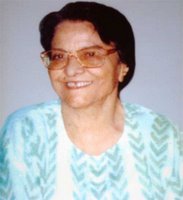
He told me they were letting go of the house and he was taking Chachi along to wherever he was posted then. Chachi came on the line - and in one of the most touching moments for me in this strange saga - asked me if it would be possible, before they left the house, to come and stay a day or two in the room that Gupta Cha had earmarked for me. I tried but I could not get the NOC needed for a visa. (Although I had left the sea - swallowing the anchor soon after Ragni's birth and Ummi's accident that confined her to a wheelchair - and started a company of my own, my passport still showed Merchant Seaman as my profession, so our Ministry had to issue NOCs.)
I never managed to contact T2 and Nanu again. Uncle Kaura, too, passed away before I could find out the address from where, maybe, I could get a forwarding address they'd left behind. On my next trip to Delhi I told Vipin about trying to find T2 and, together, we called up several Guptas, none of whom could help. I discussed with Tarun (of Tehelka) the possibility of an ad in his paper looking for these people but we never got around to it.
Fast Forward: It's late 2007. I am sitting at T2F in Karachi and get a call from a Pakistani Merchant Ship Captain, some years junior to me. We don't really know each other. He is writing a book about our Merchant Navy and wants any photos that I may have which could be used. Then he says, "I was in Bombay last week at a meeting and there was someone who wanted to get in touch with you. I promised to trace your numbers and send them to him." I imagine it's one of my many Indian fellow seafarers from the NOL (Singapore) or GESL (Hong Kong) days. But it turns out that it's someone from the Indian Navy.
"SUNIL?" I almost shout the question. "Yes." It's just too crazy! I get Sunil's number and call him up. Later, I speak with Nanu. I learn that Chachi is no more. None of us ever got to meet her :-( Then I get a Delhi number and call T2, whom I'd searched for as a Major? Colonel? Something Gupta. In all the years I was in contact with the Gupta family, no one had ever mentioned T2's full name! Turns out he is Pradeep Kumar. Chalo. And he's been living in Delhi for a few years (during many of which I've been visiting the place often, even for long periods).
Much as I wanted to, I could not attend T2's son (and my fellow Merchant Navy Officer) Abhimanyu's wedding in Jaipur, where Ashmita's family live.
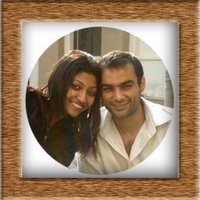 Just a few days earlier that city had suffered from bomb blasts (obviously, the blame was laid at our doorstep, as is customary) so getting a visa to that city was out of the question.
Just a few days earlier that city had suffered from bomb blasts (obviously, the blame was laid at our doorstep, as is customary) so getting a visa to that city was out of the question.Things are getting better. T2 met Ragni in Dhaka during a business trip. I met him and his wife, Ruby, when I stopped over in Delhi en route to Kolkota for a meeting. Sunil flew over from Mumbai and we had dinner together. Nanu, I hope, will be able to come to Delhi the next time I am there (hopefully in the last week of the next month). And I am dying to see the kids all grown up.
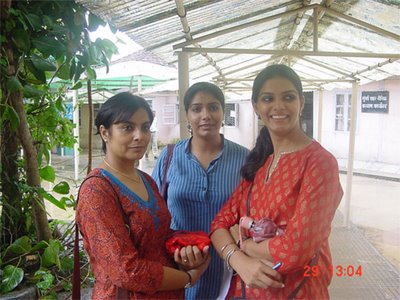
If ever there could be a suitable postscript to all this, it's this email I received just a while ago.
Peace!
Labels: Books, Events, Music, Pakistan, People, Personal, Poetry
Friday, October 17, 2008
To readers of Part 1 of An Uncanny Tale
I had no idea so many people would find interesting the long preamble to a 3-part series that I am primarily writing for my daughter and my 'acquired' family :-) Thank you for your appreciative comments and emails.
Many of you wrote to say I should post the next episode ASAP. Yaar, it takes time! Digging through the mind's vaults is easy ... the items really worth recalling shout out and beckon you ... but hunting through the physical jumble (and Nuzhat will be the first to state that it is one helluva jumble) of old albums and papers is a major chore. Then there's the scanning and cleaning up.
Writing a 'personal history' is also fraught with numerous problems for a non-writer such as I. Many episodes and happenings over the years have taken on a life of their own and developed into important (for me) separate strands ... and I have no idea how to get them all down into one comprehensive text. Maybe I should have taken Kamila's course at T2F, but I was broke.
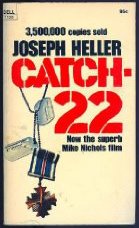
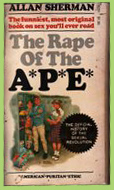 Joseph Heller solved the problem in one of my 2 most favourite books of all time, Catch-22, by throwing linearity out of the window. (The other book is Alan Sherman's The Rape of the A.P.E.. And just in case you are wondering why I'd enjoy reading some kind of perverted book about forced sex with our closely related primates, A.P.E. stands for American Puritan Ethic.)
Joseph Heller solved the problem in one of my 2 most favourite books of all time, Catch-22, by throwing linearity out of the window. (The other book is Alan Sherman's The Rape of the A.P.E.. And just in case you are wondering why I'd enjoy reading some kind of perverted book about forced sex with our closely related primates, A.P.E. stands for American Puritan Ethic.)Kurt Vonnegut developed a system I still find incomprehensible: Some of his characters flow in and out of different unconnected novels, often even cross-referencing episodes that keep me wondering about the chronological order of the writings. The oddest character in his books is Kilgore Trout, who writes cheap pulp Sci-Fi. In order to make this character more plausible than any fictitious character I have ever encountered, Vonnegut even wrote a cheap pulp Sci-Fi novel, Venus on the Half-Shell, publishing it under the name of that character. Crazy, no?
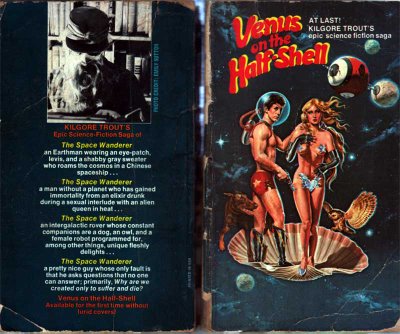
Tolstoy devised, I am told, a system that was similar to the now ubiquitous PostIts, keeping a careful record, while writing War & Peace, of where in each chapter each character figured and how that person's tale was developing. Story has it that one of the notes relating to a character who dies in an early chapter got mixed up and, so, he accidently comes back in another chapter. I can't vouch for this as I never did manage to get through the novel (it usually takes longer to read than the actual war lasted).
Blogs, with their cross-linking ability, do offer a delightful solution, but getting the Posts into a print edition, as some of you have suggested, is further complicated. However I am working on a solution.
I guess the reason some of you wanted me to post the next part quickly was to get to the end of the tale I'd labeled 'uncanny', thereby suggesting that some sort of 'twist' would follow. While I can understand the pressures of your curiosity, in order to make sense and contextualize the elements - in An Uncanny Tale / Part 2, which I will try and post a week from now - I will need to talk about 1947, skim through 1948 to 1965, hop to 1982-83, then take a long leap, directly to the end of last year.
Bear with me.
Tuesday, October 14, 2008
The 'Other' Heresies
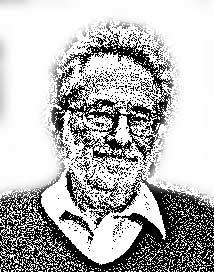 Mexican photographer Pedro Meyer is as renowned for his powerful and provocative photographs as he is for his pioneering work with digital imaging. Meyer’s photographs consistently test the limits of truth, fiction and reality. With the advent of digital photography in the early 1990s, Meyer evolved from a documentary photographer who created so-called “straight photographs” into a digital-documentarian who often combines photographic elements from disparate times and places to arrive at a different or higher truth. Pedro's oft-expressed contention that all photographs — digitally manipulated or not — are equally “true” and “untrue” has been labeled “heretical” in the orthodox documentary photography community.
Mexican photographer Pedro Meyer is as renowned for his powerful and provocative photographs as he is for his pioneering work with digital imaging. Meyer’s photographs consistently test the limits of truth, fiction and reality. With the advent of digital photography in the early 1990s, Meyer evolved from a documentary photographer who created so-called “straight photographs” into a digital-documentarian who often combines photographic elements from disparate times and places to arrive at a different or higher truth. Pedro's oft-expressed contention that all photographs — digitally manipulated or not — are equally “true” and “untrue” has been labeled “heretical” in the orthodox documentary photography community.While fellow Apple-user Pedro Meyer (one of the first to adopt this platform and launch the very first intearactive CD-ROM!) may have his exhibition - Heresies - opening in 60 museums in almost as many countries (we are thrilled that T2F, where the exhibition opens on 21st October, has been selected as the Pakistani venue) there are others, like me, whose photographs have also made it to some of the greatest (virtual!) halls in the world. Here are just 4 examples.
"Happy viewing", as the Senator said!
;-)
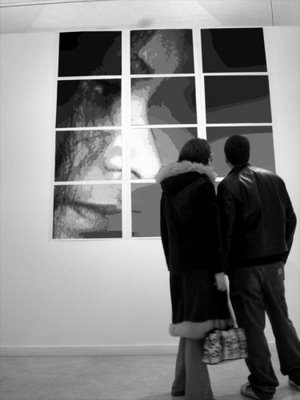
Nuzhat
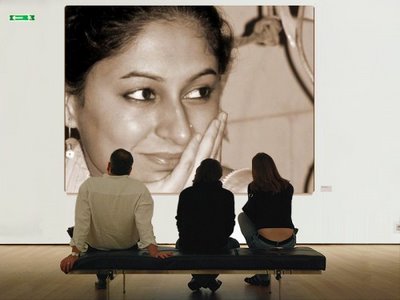
Ragni
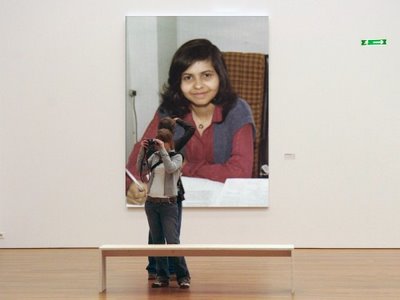
Jehan Ara
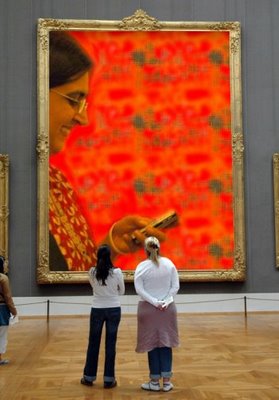
Sabeen
See you at the real Heresies, where a selection of large original museum quality prints of Pedro's works will be displayed and changed almost weekly!
Please do keep checking out the schedule at T2F's website for the exciting related events, like workshops, talks, discussions, and presentations during the weeks that this unique exhibition is on, unless you're on FB and already visit T2F Pages for updates.
Oh ... did you know that you can also subscribe to T2F's Events RSS Feed so you get the news automatically? And, as the icing on the cake, sign up for SMS alerts and get timely reminders too. This saves you the task of 'remembering to remember' to go to the website and saves me answering calls - usually when an event is actually happening - Maddy, please note ;-) - about when and what time it's happening.
Labels: Apple, Art, Bloggers, Education, Events, Media, News, Pakistan, People, Personal, T2F, Technology
Monday, October 13, 2008
Sheer Magic

"Any sufficiently advanced technology is indistinguishable from magic." - Arthur C. Clarke
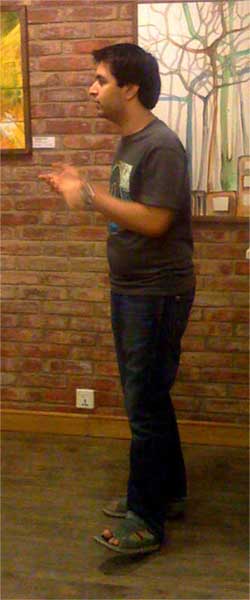
The story of the development of Jaadu, the first iPhone/iPod application by a Pakistani, was almost as magical as the software itself. The timeline from the first 'proof of concept' to what it now is - an application that was selected by Apple for its What's Hot section at the App Store - was amazingly short. Equally fascinating was the way the business itself developed for his company - Jugaari.
I really wish that more young people would realize what Jahanzeb did: You could be sitting in any remote corner of the world today and, like him, and many others - singly or in very small groups - have access to the markets of the world. All the opportunities are there and, generally, barring the cost of a computer, they are all FREE (rhymes with "Wheeeeee!"): Free wifi and a working table with an electrical outlet nearby { if you are in Karachi, come to T2F :-) }, free access to information, free-of-postage email, free voice calls and video conferences via iChat or Skype, free access to other developers and techie support groups ... what more can you ask for? And remember, developing a product with a coffeehouse space as your 'office' has some advantages: Caffeine Boosts Creativity ;-) as Delicious Library shows.
On the geekier side, of interest to many was the comparison between the development platforms under different OSs. Jahanzeb had been using Windows for a long while and even developed the first versions of his iPhone application using that environment but has now switched to a Mac ... so his comments on the development and usage sides for both platforms was informative.
The discussion on comparative use of Apple's App Store to market an application versus direct sales to the consumer was interesting, too, since most had felt that Apple retaining 30% of the sale price and giving the developer only 70% was a bit unfair. The argument for it, as enunciated by Jahanzeb - who made the switch to Apple's way after being on the other side (distributing the precursors to Jaadu through other sources) - rested on the number of people Apple gave him exposure to. Everyone with the iPhone or an iPod Touch was certain to visit the App Store, making for an outreach to several million potential customers. The fact that Apple also took care of several other factors that indie developers would rather not have to bothered by was a bonus. We also learnt from a member of the audience who had the experience of developing for two other mobile phone brands, that the others paid developers a much lesser %age because they had a larger market share.
Thank you, Jahanzeb, for a lovely evening. Hope to see more apps from you soon.
Labels: Apple, Events, Media, News, Pakistan, Reviews, Science, T2F, Technology
Sunday, October 12, 2008
India 3: An uncanny tale ... (Part 1 — The Rather Long Preamble)
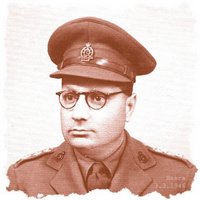 Rewind to late-1944 to 1945 (give or take 6 months ... for I am just guessing). The Second World War is in full swing. My father, a doctor, has had to enroll in the Army. The three of us - Abi, Ummi, and I - are constantly on the move from camp to camp.
Rewind to late-1944 to 1945 (give or take 6 months ... for I am just guessing). The Second World War is in full swing. My father, a doctor, has had to enroll in the Army. The three of us - Abi, Ummi, and I - are constantly on the move from camp to camp.Abi's short postings take us into cantonments from Jhansi to Campbellpur - places now in two different countries but made famous by their queens - and several others towns I can only vaguely recall. For some details, however, my memory is almost photographic: I can recall every face at our table - even the orange floral pattern on the sari Ummi was wearing - when the cook, Salamat, came running in to warn us that Sultana Daku was about to attack. Of course, like most things associated with Salamat, it turned out to be a figment of his opium-inspired imagination. I guess why I haven't forgotten the incident is because I have been forever chided for asking "Will he sign my autograph book?"
I am 4+ years old and always the only child at all of these places, as far as I can recall. (Wish I had asked my parents why that was so ... for it does seem odd to me now.) This lack of peers makes me spend most of my time around the same things that the grown-ups around me enjoy: books, magazines, music, poetry ... and sitting with them, trying to make sense of their discussions.
Travelling with us everywhere, among Abi's uniforms, Ummi's saris & ghararaas, my favourite embroidered chikan kurtaas (and my own uniform) is my box of Meccanos #0/#1 and a small crate of Abi-Ummi's books.
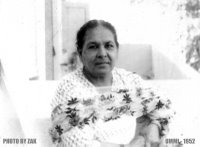 Apart from Ummi's stack of Ismat issues and Kohé Qaaf Kay Peechhay - a book of children's stories from which she read to me - I can recall 4 of them even 60+ years later: There is a Deevaané Ghalib, for which my mother has made a slipcase in papier-maché and decorated with dried leaves. On one large leaf is her attempt at a pen-sketch of Ghalib that she is very proud of, until one of Abi's colleagues assumes the sketch to be Jesus. (He thinks the book is an Urdu translation of the Bible and is being kept, like Qurãns, in a jüzdaan). The other books are Palgrave's Golden Treasury, Feroze-ul-Lughaat (Farsi), and a Platts' Dictionary that was gifted to Abi by someone at one of the camps. The latter 2 are still with me :-)
Apart from Ummi's stack of Ismat issues and Kohé Qaaf Kay Peechhay - a book of children's stories from which she read to me - I can recall 4 of them even 60+ years later: There is a Deevaané Ghalib, for which my mother has made a slipcase in papier-maché and decorated with dried leaves. On one large leaf is her attempt at a pen-sketch of Ghalib that she is very proud of, until one of Abi's colleagues assumes the sketch to be Jesus. (He thinks the book is an Urdu translation of the Bible and is being kept, like Qurãns, in a jüzdaan). The other books are Palgrave's Golden Treasury, Feroze-ul-Lughaat (Farsi), and a Platts' Dictionary that was gifted to Abi by someone at one of the camps. The latter 2 are still with me :-)My lifelong habit of travelling heavy is obviously inherited from my parents, for there is also another 'essential' and much cared-for set of items that weigh a ton and go everywhere with us: A black trunk that contains an HMV wind-up gramophone and a small music 'collection' (78 RPM records), neatly stored in 2 metal boxes, painted dark green. Inscribed on them in white paint: WEST; EAST. The first holds some records by Caruso, Gigli, Chaliapain, McCormack, and Debussy's Claire De Lune by someone. Imagine how often I must have heard all these names to be familiar with them at that age! The second, a bigger box, is populated by our own classical music's demi-gods: Fayyaz Khan, Karim Khan, Bai Kesarbai, Omkarnath Thakur, Enayat Khan. It also has a thin balsa wood partition that keeps these giants segregated from mere mortals who sing "light pieces": K. L. Saigal*, Akhtari Bai, Kamla Jharia. There's even a Talat Mahmood (his very first: Sab Din Ayk Samaan Naheeñ Tha) - included, I suspect, more because of Abi's almost-paternal love for his younger cousin than for the song. (Ummi enjoyed the song, but it just wasn't on my father's musical hot-list ... although he got all teary-eyed and mushy whenever we played it!)
At one or two camps, where we stayed relatively longer, Abi made friends with a few people equally interested in English literature, Urdu shaaeri, and music. The well-known humourist, Dr. Shafiq-ur-Rahman, was my father's junior at one camp and was always a barrel of fun when he came over, with my mother and others teasing him about some new nurse or the other he would fall for on a fortnightly basis. (This, I narrate not as much from memory as from tales retold.) Shafiq chacha and my father had everyone rolling with laughter as they used crazy words, such as Posheedah Ghünchee for Chhipkalee). There were humourous verses, too, a few of which, including a ghazal with a funny qaafiah ("ch, ch" = "tsk, tsk" - by Abi) appear in Shafiq Chacha's book, Lahrayñ. This scanned image of three of its couplets is from Abi's bayaaz.
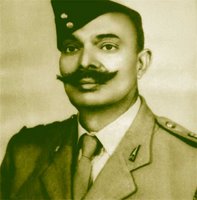 Three other people who stayed in touch over the years were Khan Chacha, Badshah Chacha, & Gupta Chacha. The first two came to Pakistan and our family ties continued beyond their deaths and those of my father and mother. Sadly, Badshah Chacha (whose eldest son laughingly claims to have been conceived at our house) died very early. Khan Chacha was around for quite a while and continued visiting Ummi and me regularly after my father passed away in 1963. Despite the fact that these two chachaas were part of my life as I grew up in Karachi - and were extremely affectionate and caring - it was "Gupta Cha", left behind in India, whom I inexplicably missed most.
Three other people who stayed in touch over the years were Khan Chacha, Badshah Chacha, & Gupta Chacha. The first two came to Pakistan and our family ties continued beyond their deaths and those of my father and mother. Sadly, Badshah Chacha (whose eldest son laughingly claims to have been conceived at our house) died very early. Khan Chacha was around for quite a while and continued visiting Ummi and me regularly after my father passed away in 1963. Despite the fact that these two chachaas were part of my life as I grew up in Karachi - and were extremely affectionate and caring - it was "Gupta Cha", left behind in India, whom I inexplicably missed most.Fast Forward: It's January 1946. The war has been over for months. We are in Delhi, where Abi has rented a space and set up a small clinic, which he hopes to expand. He has asked for a release from the Army and is waiting for it to arrive. Ummi is busy all day, putting together crockery and stationery, even embroidering a floral K on new bed-sheets and pillow-covers for the 2-bed 'overnight hospital' they hope to build in the small space behind the clinic some day.
Our flat above the clinic is small but frequently filled with poets and writers, because Abi is the Joint Secretary of Anjumané Taraqqiyé Urdu. (The other 'joint' being a young Jamiluddin Aali). I have vague memories of Ustaads like Jigar and Seemaab on one or two occasions and a clearer one - from what may have been the last week in that house - of a very young Habib Jalib, whom I remember because of his beautiful voice, long hair, and the super-shiny :-) white sharkskin shervaani.
We are just beginning to settle down but Abi is suddenly asked to report for another year and is shunted off to medical camps in Baghdad, Cairo, and Jerusalem. Keen on Biblical History - it is from him, again, that I get my passion for it - these postings thrill him as he visits hundreds of legendary sites. Take a look at a picture of Jesus's traditionally claimed birthplace from Abi's album.
Abi even visits Karachi during his to-ing and fro-ing and is impressed by what was then a lovely, friendly and exremely clean city. Here's a view that I also found in his album of Elphinstone Street (now Zebunnisaa Street, named - oddly, methinks - after the daughter that King Aurangzeb kept imprisoned for years***). Times change! The city has changed in every conceivable and inconceivable way, but I still love it, madly!
The air in our Dilli house is beginning to fill with the talk of Pakistan. My mother's cousin, Ziauddin Kirmani (ZDK) is constantly heard arguing for the Muslim League, while my father and a few of his politically active Congress-supporting friends argue for a united India.
Interesting factoid: ZDK edited and published, from Lucknow, a paper called Pakistan ... well before the name was coined for this country. Later, he also authored a biography of the Prophet, The Last Messenger with a Lasting Message - An Unconventional Study (recently re-published by his son, Tariq, and available at T2F). I'd strongly recommend it to those looking for a fresh approach, interesting references related to early Islamic history, and succinct biographical sketches of the Prophet's contemporaries ... but I must warn readers that certain sects have been upset about a couple of portrayals. The book is intriguingly dedicated "to those who seek the truth and are prepared to face it".Soon, my father leaves for his new posting, packing Ummi and me off to to my maternal aunt in Calcutta, where her husband works for the Sea Customs. Also in Calcutta (now Kolkota) lives my paternal grandfather (of whom everyone I know is scared to death) ... more about him in some other post ... so it is a treat for all of us that my uncle is soon posted to Budge-Budge (now Baj-Baj), an oil pier 2o miles up the Hooghly. The distance from central Calcutta, though short, is mercifully not entirely conducive to my grandpa dropping in too frequently.
1947 arrives with bloodshed and riots in Calcutta, turning the Hooghly occasionally pink. My only playmate - Sattar, a family servant's child brought up by my aunt and just a bit older than I - spot a body or two floating up-river with the tide. We even have a rather gruesome encounter with a severed head, once.
My uncle, Asad Ali, and his close friend and neighbour, Shaukat Chacha, are employed in the Sea Customs because of their hockey prowess. They talk each day about how close "we" are to attaining Pakistan. My uncle and aunt are extremely fond of me. They have no child of their own and are like my second-set of parents. I even call them Ammi Jaan and Abbu Jaan, titles generally used to address one's own parents. In contrast to my parents, they are such fanatical Muslim Leaguers, they even alter my name. Not legally, of course, thank goodness. But in my books and notepads I am made to write Mohammad Zaheer Alam Kidvai Jinnahi! One of these books I still own: It is Vol. 2 of Hafeez Jallandhari's Shaahnaamaé Islam, which I used to once recite full throatedly to anyone who'd listen, thrilled at the descriptions of the bloody battles and the 'heroic' deeds of the early Muslims. Until I grew up ...
It's August 1947, now. Pakistan is a reality. Where we are is relatively safe but from conversations and the BBC news over the radio we hear that things are bad everywhere. Our family has to move out and head to Bombay from where we are to travel to Karachi, since Abbu Jan has 'opted' for West Pakistan. I suspect that the decision to not move to East Pakistan - so much closer to Calcutta and an obviously easier/safer move - was taken partly because my grandpa was migrating to Dhaka ;-) (Did I forget to tell you that my daada was also Abbu Jan's elder brother? Not too confusing a relationship, actually. Just a case of an uncle and a nephew, only 6 years apart, marrying 2 sisters!)
Abi is to meet us in Bombay and take us 'home', to Delhi, while the others sail away to Karachi. I can hardly wait to get 'home'.
The long journey takes us through three train changes and a circuitous route which, for the life of me, I cannot recall. On the last leg of the journey we are told that, now, there are riots everywhere and trains are being stopped and attacked. People are being killed by one or the other party, depending upon your religion and theirs, casting aside the veneers of pretense about professed humaneness and love that followers on both sides boast incessantly about in less challenging times. I guess in order to not scare me and 2 other slightly older kids in the compartments the elders don't talk about any of this much. Or about anything. Their silence - specially that of Ummi and Ammi Jan, generally non-stop talkers :-) seems eveb scarier to Sattar and me.
At one station we have a surprise in store: A uniformed, beaming-as-always Gupta Cha bounds into the carriage and travels with us all the way to Bombay. At one point - when the train is stopped by a Hindu mob - he leans out of the window and announces that he and his large family travelling with him are Hindus and the only occupants of that compartment. Uniforms didn't get questioned, even then!
Allow me to digress, but this reminds me of a joke that became popular at the time of Ayub Khan's 1958 Martial Law. A man standing at the Indo-Pak border sees a horde of rabbits scurrying across to the Indian side from ours. He manages to stop and grab an old hobbling rabbit and asks him what they are running away from. Desperately trying to wiggle out of the man's grasp, the old rabbit says that the Pakistan Army has ordered the capture of all horses for its use. "But you're a rabbit", says the man. "Yeah. But ...", says the squirming rabbit, "have you ever tried to argue with a soldier?"The other family in the compartment, obviously Muslim (one of the women has been reading a small Qurãn which is hidden away each time the train stops) looks worried. Gupta Cha walks up to the old man among them and says something, then summons a railway guard and takes a brass T-shaped key from him and locks the door from inside. Silent glances are exchanged. One of the women starts to weep. Ummi walks over and sits with her for the rest of the overnight journey.
We reach Bombay, safely. Or, at least half the train does. The second half has been de-linked in some ambush somewhere. I piece this together from hushed conversations. A lot of the luggage, too, is gone. Abbu Jan informs us that many compartments are chalk-marked 'MT'. I wonder for hours what 'MT' could mean, before realizing that he said 'empty'. My uncle and aunt lose nothing, though. All their stuff arrives safely, including their gramaphone and large record collection.
Ummi has just a small trunk of clothes that's been in the carriage with us. I tow an empty army-issue bistarband ("because it's Abi's!") and a small but heavy trunk with a couple of toys, a plate that I cherish to this day (it's segmentation seemed almost satirical years later in the wake of the 3-way partition, so it got dubbed among us cousins, who often fought to eat in it, the Partition Plate), a few small books, and the latest Khilona magazine. There are also 3 records (wrapped safely in a towel): a children's song by someone about a Dahi ba∂ay vaali, Omkarnath Ji's Kedam kee chhaya, and Caruso's La donna è mobile (all of which I loved listening to, every opportunity I got, to the bemusement of my elders).
Ummi and I are expecting to see all our stuff in Delhi, soon. I can't wait to get to our asli gramaphone, the one in our drawing room, with the huge golden horn ... and the strangely intriguing machine that Abi has inherited from his mother, one that plays music off amberol cylinders, of which we only have 4 (they are never touched, except when I plead really hard for listening to one of them). I am mesmerized as I hear and watch those cylinders that seem somehow more magical than the black records.
We meet Abi and find out that the house in Karolbagh has been looted and burnt. "My toys and the cylinders, too?", I ask, worried. But Ummi is now sobbing uncontrollably and no one is in the mood to answer my silly question. Soon, I cry, too, as Abi tells us more about the house. Although I am sure I did not really understand much, I do glean that our landlord, Rauf sahab, has been kidnapped and presumed killed. His wife - who was visiting someone else at that time - is missing.
Jump briefly to a scene ahead: 4 years later, we discover Mrs. Rauf in Karachi. Abi finds and recognizes her at a Police Station near Guru Mandir, where he is called "to sedate a mad woman". She had travelled across with other relations, we learn later from the people who come to 'claim' her back, and has gone raving mad over the years.)Abi tells us he has spoken with senior persons in the congress party, specially Dr. Syed Mahmud (Nuzhat's maternal grandfather), a close friend and associate of Pandit Nehru.
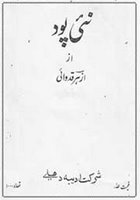
Naana Jaan (as we called him) was much loved an admired by Abi, who had dedicated his book of essays and stories - Naee Paud - a few years earlier to him in remembrance of the student days at Aligarh when Nana Jan was a greatly admired activist.
Everyone has advised that we head out to Pakistan and return 'once the dust has settled'. (Vazira Zamindar's excellent book, The Long Partition, indicates that not only did many feel this way but some, in fact, did return to their old homelands**). I am stumped today, as I think back, at the naivete of all the Congress and Muslim League leaders, none of whom seemed to have had any inkling of the level of tragedy that this act of separation - still debated within our own country (and criticized, without even an attempt at understanding the reasons, in India) - would assume.
(To be continued ...)
* If you want a link from where you can download a wonderful audio file of Naushad's recollections of Saigal (well worth hearing), email me.
**POSTSCRIPT: Added 19th October 8:00 AM
I just came across some comments by a Mr. Ali Dada (Ref: Oct 18, 6.04PM) on the ATP site where this post has been included by its editors. While I have responded to his other bits at that site, I do wish to clarify one thing here because - judging by his conclusion - I did not, obviously, come across clearly enough on this one point: My reference to 'going back' was not only about people who crossed this way going back to India but something that took place in both countries after partition. (Mr. Dada obviously did not notice that I had said "return to their old homelands".) In fact the process was also ‘officially supported’ for a while on both sides of the border. Newspaper ads and other evidence, including some stats, for this are offered in Ms Zamindar’s book.
*** Another update (October 22nd) as a result of a comment by Gopi on ATP - and also pointed out in two emails.
First, Gopi: ... Such an interesting piece. Incidenally, the Zaibunnissa Street in Karachi is named after Zaib-un-Nissa Hamidullah, the firebrand editor of the Mirror who gave such a hard time to Ayub Khan in the last years of his presidentship. She was an Anglo-Indian (Bengali father and British mother) but married into a Punjabi family. Check out [this].
My response on AT: @Gopi - Thanks for the Zaibunnisa 'correction'. I know that was what was proposed and has been recorded by many. However, when some people raised an objection to naming it after her and said that her friends and family had 'pulled strings' to have this done, the authorities responded by pulling Priness Zaibunnisa out of their hat :-) ... but I guess your version, since it is now supported by Wikipedia, stands.
Labels: Books, Events, Music, Pakistan, People, Personal, Poetry, Urdu
Tuesday, October 07, 2008
Keep out of my mailbox, please ...
I am angered by spamming, in general, and usually write almost instantly back, in as rude terms as I can, demanding to be taken off the offending list and often suggesting where they can stick their products, if the size is right. Sometimes it works (I am referring to being taken off the list, not to the suggested action), though more often it doesn't ... there are too many persistently annoying bastards in this world. But it does help me get rid of my anger.
Some spammers send me unsolicited religious messages, occasionally asking me to repent. To them I am politer, limiting myself to expressing the view that spamming is the cyber equivalent of entering a house without knocking - a practice, I believe, that is un-Islamic.
More often I get religion-oriented spam to understand why the sender's rival is a fraud (the recent spate of anti-Ghamdi emails is an example). To them, when possible, I send back their emailed .doc attachment after carefully replacing all occurrences of their names with their rival's and vice versa. Not too surprisingly every charge one brings upon the other holds equally valid after this switch.
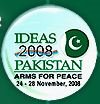 Today, some ass whom I do not know - and certainly do not wish to know - has sent me 'warm regards' (I wonder what he sends real friends, if he has any) and says he is looking forward to welcoming me "at 5th International Defence Exhibition & Seminar – IDEAS 2008!" As a pacifist I am even further offended at this particular spam, not just because it represents all that I detest but for promoting an event that has the loony tagline: Arms for Peace!
Today, some ass whom I do not know - and certainly do not wish to know - has sent me 'warm regards' (I wonder what he sends real friends, if he has any) and says he is looking forward to welcoming me "at 5th International Defence Exhibition & Seminar – IDEAS 2008!" As a pacifist I am even further offended at this particular spam, not just because it represents all that I detest but for promoting an event that has the loony tagline: Arms for Peace!What are we going to see next? Dicks for Virginity?
Labels: Activism, Events, Media, Pakistan, People, Personal, Politics, Rant, Religion, Technology
Thursday, October 02, 2008
Ten years on!
When my company, Enabling Technologies,
(later owned and run by Jehan Ara)
developed and launched the internationally acclaimed
Interactive CD-ROM: Faiz - Aaj Kay Naam
the main members of the team were
Sabeen, Jehan, Nuzhat & myself.
Sabeen has also posted an earlier picture
of this foursome!
This was the same team that
had produced Pakistan's first-ever
Interactive CD-ROM for IBM Pakistan
(ironically developed on Macs)
on Pakistan's 50th Birthday.
For the same occasion
we had also developed another CD-ROM
50 Years of Art in Pakistan
(featuring 112 Artists, Sculptors, and Ceramists)
for ABN-AMRO Bank.
None of us are formally qualified
IT or Business specialists and have learnt everything
about both these fields on our own ...
so it's rather interesting to see how our lives
have revolved around Technology and Business.
Nuzhat is an Education Technology Consultant
and has facilitated the development of many
school IT programs and in-service training.
Jehan Ara is the President of P@SHA
(Pakistan Software Houses Association).
Sabeen is the President of the Karachi Chapter
of TIE (The Indus Entrepreneurs).
And I am a blogger!
:-)
Labels: Apple, Bloggers, Literature, Media, People, Personal, Poetry, Technology, Urdu
Full Circle
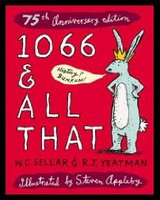 Around 40 years ago, a couple of years before we were married, I introduced Nuzhat to the Sellar & Yeatman classic, 1066 & All That - a book I had discovered in Abi's library and had spent hours ROTFL.
Around 40 years ago, a couple of years before we were married, I introduced Nuzhat to the Sellar & Yeatman classic, 1066 & All That - a book I had discovered in Abi's library and had spent hours ROTFL.As I mentioned - in an earlier post (where there are links to some interesting aspects of it) - the book was lost and I had been unable to find a copy.
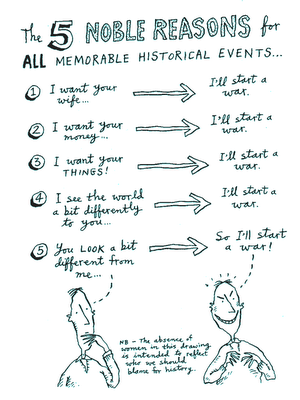
In 2005 a 75th Anniversary edition was published and sold out pretty fast. So I missed it again. And while Amazon did offer some used copies through affiliates, I wanted a spanking crispy new book. Another printing had been promised and I have been eagerly awaiting the announcement.
Last week Nuzhat walked miles in Edinburgh, looking for it in numerous bookshops, and found possibly the last available copy in that city. What a birthday and homecoming gift!
While the book is more likely to appeal to those familiar with British History (which is what my generation studied), there are several things in it that are timeless, such as this analysis.

Labels: Books, Literature, Personal
